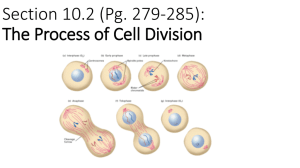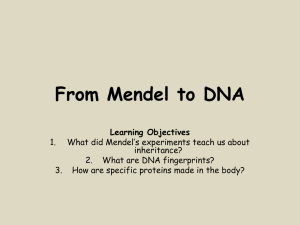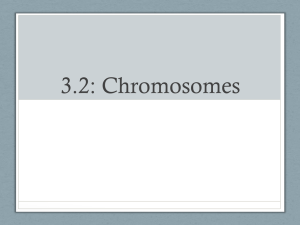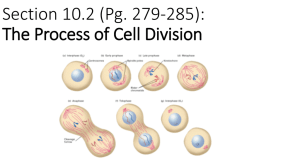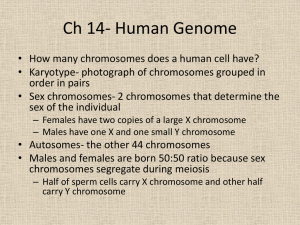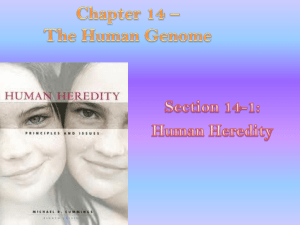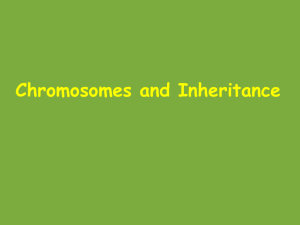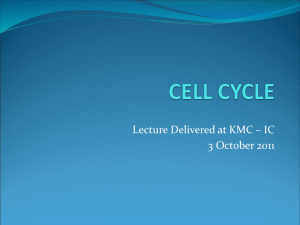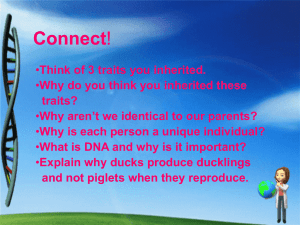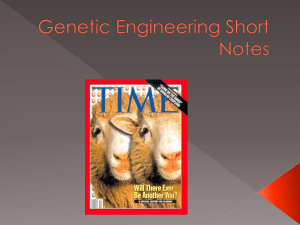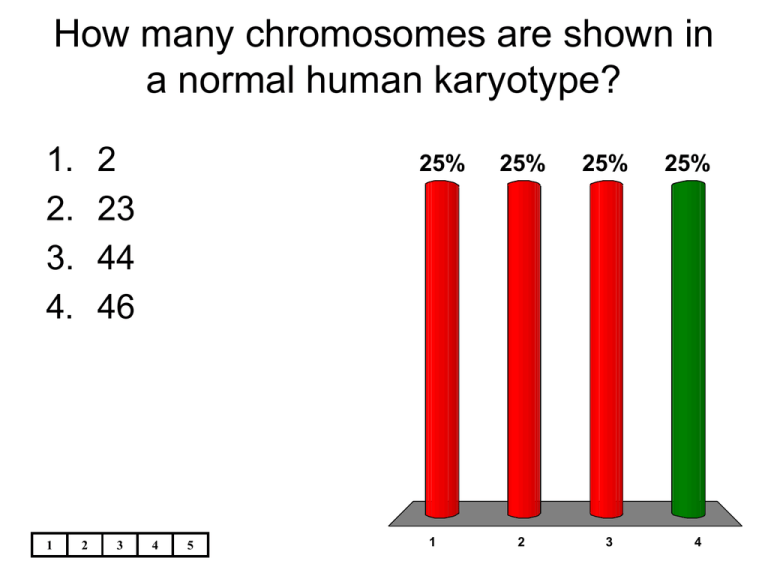
How many chromosomes are shown in
a normal human karyotype?
1.
2.
3.
4.
1
2
23
44
46
2
3
25%
4
5
1
25%
25%
2
3
25%
4
Which of the following are
shown in a karyotype?
1. homologous
chromosomes
2. sex chromosomes
3. autosomes
4. all of the above
1
2
3
4
5
25%
1
25%
25%
2
3
25%
4
Which of the following can be
observed in a karyotype?
1. a change in a
DNA base
2. an extra
chromosome
3. genes
4. alleles
1
2
3
4
5
25%
1
25%
25%
2
3
25%
4
In humans, a male has
1.
one X chromosome
only.
two X chromosomes.
one X chromosome and
one Y chromosome.
two Y chromosomes.
2.
3.
4.
1
2
3
4
5
25%
1
25%
25%
2
3
25%
4
Human females produce egg
cells that have
1. one X chromosome.
2. two X
chromosomes.
3. one X or one Y
chromosome.
4. one X and one Y
chromosome.
1
2
3
4
5
25%
1
25%
25%
2
3
25%
4
What is the approximate probability that
a human offspring will be female?
1.
2.
3.
4.
1
10%
25%
50%
75%
2
3
4
25%
5
1
25%
25%
2
3
25%
4
What percentage of human sperm
cells carry an X chromosome?
1.
2.
3.
4.
1
0%
25%
50%
100%
2
3
4
25%
5
1
25%
25%
2
3
25%
4
A human female inherits
1.
one copy of every gene located on each
of the X chromosomes.
twice as many sex chromosomes as a
human male inherits.
one copy of every gene located on the Y
chromosome.
all of the same genes that a human
male inherits.
2.
3.
4.
25%
1
1
2
3
4
5
25%
25%
2
3
25%
4
In a pedigree, a circle
represents a(an)
1.
2.
3.
4.
1
male.
female.
child.
adult.
2
3
4
5
25%
1
25%
25%
2
3
25%
4
A pedigree can be used to
1. determine whether a trait is
inherited.
2. show how a trait is passed from
one generation to the next.
3. determine whether an allele is
dominant or recessive.
4. all of the above
25%
1
1
2
3
4
5
25%
25%
2
3
25%
4
Which of the following would you
be least likely to see in a pedigree?
1. All of the symbols
are unshaded.
2. All of the symbols
are shaded.
3. All of the symbols
are squares.
4. About half of the
symbols are circles.
1
2
3
4
5
25%
1
25%
25%
2
3
25%
4
Which of the following is caused
by a dominant allele?
1. Huntington’s
disease
2. PKU
3. Tay-Sachs
disease
4. none of the above
1
2
3
4
5
25%
1
25%
25%
2
3
25%
4
Which of the following is
determined by multiple alleles?
1.
2.
3.
4.
1
Rh blood group
ABO blood group
PKU
Huntington’s
disease
2
3
4
5
25%
1
25%
25%
2
3
25%
4
A person who has PKU
25% 25% 25% 25%
1.
inherited the recessive allele for the
trait from one parent.
inherited the recessive allele for the
trait from both parents.
is heterozygous for the trait.
will not pass the allele for the trait to
his or her offspring.
2.
3.
4.
1
1
2
3
4
5
2
3
4
Which of the following genotypes
result in the same phenotype?
IAIA and IAIB
IBIB and IBi
IBIB and IAIB
IBi and ii
1.
2.
3.
4.
1
2
3
4
5
25%
1
25%
25%
2
3
25%
4
If a man with blood type A and a woman with
blood type B produce an offspring, what
might be the offspring’s blood type?
25% 25%
25%
25%
1. AB or O
2. A, B, or O
3. A, B, AB, or O
4. AB only
1
2
3
4
5
1
2
3
4
Which of the following
statements is NOT true?
25%
1.
25%
2.
A person with Huntington’s disease might not pass
the allele for the disease to his or her offspring.
A person with Huntington’s disease might be
homozygous for the disease.
Huntington’s disease is caused by a recessive
allele.
A person who inherits one allele for Huntington’s
disease will develop the disease.
3.
25%
4.
25%
1
2
3
4
5
Sickle cell disease is caused by
a
1. change in one DNA base.
2. change in the size of a
chromosome.
3. change in two genes.
4. change in the number of
chromosomes in a cell.
25%
1
1
2
3
4
5
25%
25%
2
3
25%
4
In cystic fibrosis, a change in a single gene
causes the protein called CFTR to
1. become less
soluble.
2. fold improperly.
3. destroy the cell
membrane.
4. transport sodium
ions instead of
chloride ions.
1
2
3
4
5
25%
1
25%
25%
2
3
25%
4
1.
2.
3.
4.
1
Compared with normal hemoglobin, the
hemoglobin of a person with sickle cell
disease
25% 25%
25%
25%
is longer.
is shorter.
has a different
sequence of
amino acids.
is wider.
2
3
4
5
1
2
3
4
Which of the following does
NOT lead to cystic fibrosis?
1. missing codon in
mRNA
2. shorter CFTR
polypeptide chain
3. point mutation
4. absence of CFTR
in cell membrane
1
2
3
4
5
25%
1
25%
25%
2
3
25%
4
People who are heterozygous for sickle cell
disease are generally healthy because
1.
2.
they are resistant to malaria.
they usually have some normal
hemoglobin in their red blood cells.
their abnormal hemoglobin usually
doesn’t cause their red blood cells to
become sickle shaped.
they do not produce abnormal
hemoglobin.
3.
4.
25%
1
1
2
3
4
5
25%
25%
2
3
25%
4
The sequencing of human
chromosomes 21 and 22 showed that
1.
some regions of chromosomes do not
code for proteins.
all of the DNA of chromosomes codes
for proteins.
different chromosomes have the same
number of genes.
different chromosomes contain the
same number of DNA bases.
2.
3.
4.
25%
1
1
2
3
4
5
25%
25%
2
3
25%
4
Alleles found on the same
chromosomes
1. are dominant.
2. are never
separated by
recombination.
3. are linked.
4. contain repetitive
DNA.
1
2
3
4
5
25%
1
25%
25%
2
3
25%
4
The long stretches of repetitive DNA in
chromosomes 21 and 22 are unstable sites
1.
2.
that contain genes.
where rearrangements
occur.
that cause genetic
disorders.
that do not allow
crossing-over to occur.
3.
4.
1
2
3
4
5
25%
1
25%
25%
2
3
25%
4
Most sex-linked genes are
located on
1. the autosomes.
2. the X chromosome
only.
3. the Y chromosome
only.
4. both the X
chromosome and
the Y chromosome.
1
2
3
4
5
25%
1
25%
25%
2
3
25%
4
Colorblindness is more common in
males than in females because
1.
fathers pass the allele for
colorblindness to their sons only.
the allele for colorblindness is located
on the Y chromosome.
the allele for colorblindness is
recessive and located on the X
chromosome.
males who are colorblind have two
copies of the allele for
colorblindness.
2.
3.
4.
1
2
3
4
5
25%
1
25%
2
25%
3
25%
4
Which of the following
statements is true?
1.
2.
Females cannot have hemophilia.
The father of a colorblind boy may be
colorblind.
A sex-linked allele cannot be
dominant.
The mother of a colorblind boy must
be colorblind.
3.
4.
25%
1
1
2
3
4
5
25%
25%
2
3
25%
4
Which of the following form(s) a
Barr body?
1.
2.
3.
the Y chromosome in a male cell
the X chromosome in a male cell
one of the X chromosomes in a
female cell
both of the X chromosomes in a
female cell
4.
25%
1
1
2
3
4
5
25%
25%
2
3
25%
4
The formation of a Barr body
1.
causes the genes on one of the X
chromosomes in a female cell to be
switched off.
always causes the same X
chromosome in a female’s cells to be
switched off.
switches on the Y chromosome in a
male cell.
none of the above
2.
3.
4.
25%
1
1
2
3
4
5
25%
25%
2
3
25%
4
A cat that has spots of only one
color
1. has no Barr
bodies.
2. must be a male.
3. must be a female.
4. may be a male or
a female.
1
2
3
4
5
25%
1
25%
25%
2
3
25%
4
The failure of chromosomes to
separate during meiosis is called
1. nondisjunction.
2. X-chromosome
inactivation.
3. Turner’s
syndrome.
4. Down syndrome.
1
2
3
4
5
25%
1
25%
25%
2
3
25%
4
Because the X chromosome contains genes
that are vital for normal development, no
baby has been born
1. with one X
chromosome.
2. with three X
chromosomes.
3. without an X
chromosome.
4. with four X
chromosomes.
1
2
3
4
5
25%
1
25%
25%
2
3
25%
4
Which of the following combinations of sex
chromosomes represents a female?
1.
2.
3.
4.
1
XY
XXY
XXXY
XX
2
3
4
5
25%
1
25%
25%
2
3
25%
4
If nondisjunction occurs during
meiosis,
1.
only two gametes may
form instead of four.
some gametes may
have an extra copy of
some genes.
the chromatids do not
separate.
it occurs during
prophase.
2.
3.
4.
1
2
3
4
5
25%
1
25%
25%
2
3
25%
4
Nondisjunction can involve
1. autosomes.
2. sex
chromosomes.
3. homologous
chromosomes.
4. all of the above
1
2
3
4
5
25%
1
25%
25%
2
3
25%
4
Scientists test for alleles that cause
human genetic disorders by
1. making karyotypes.
2. making DNA
fingerprints.
3. detecting the DNA
sequences found in
those alleles.
4. making pedigrees.
1
2
3
4
5
25%
1
25%
25%
2
3
25%
4
The process of DNA fingerprinting
is based on the fact that
1.
the most important genes are different
among most people.
no two people, except identical twins,
have exactly the same DNA.
most genes are dominant.
most people have DNA that contains
repeats.
2.
3.
4.
25%
1
1
2
3
4
5
25%
25%
2
3
25%
4
What conclusion CANNOT be made from
two DNA fingerprints that show identical
patterns of bands?
1.
The DNA from the two DNA
fingerprints almost certainly came
from the same person.
The DNA from the two DNA
fingerprints definitely came from two
different people.
The DNA from the two DNA
fingerprints was separated by size.
The DNA repeats that formed the
bands in each DNA fingerprint are
the same length.
2.
3.
4.
1
2
3
4
5
25%
1
25%
25%
2
3
25%
4
The Human Genome Project is
an attempt to
1.
make a DNA fingerprint
of every person’s DNA.
sequence all human
DNA.
cure human diseases.
identify alleles in human
DNA that are recessive.
2.
3.
4.
1
2
3
4
5
25%
1
25%
25%
2
3
25%
4
The human genome was
sequenced
1.
by sequencing each gene on each
chromosome, one at a time.
using DNA fingerprinting.
by looking for overlapping regions
between sequenced DNA
fragments.
using open reading frames.
2.
3.
4.
25%
1
1
2
3
4
5
25%
25%
2
3
25%
4
Which of the following information CANNOT
be obtained from the Human Genome
Project?
1.
causes of genetic
disorders
amino acid sequences
of human proteins
locations of genes on
chromosomes
whether an allele is
dominant or recessive
2.
3.
4.
1
2
3
4
5
25%
1
25%
25%
2
3
25%
4
The purpose of gene therapy is
to
1.
2.
cure genetic disorders.
determine the
sequences of genes.
remove mutations from
genes.
change dominant alleles
to recessive alleles.
3.
4.
1
2
3
4
5
25%
1
25%
25%
2
3
25%
4
Which of the following is the first
step in gene therapy?
1.
2.
splicing the normal gene to viral DNA
allowing recombinant viruses to infect
human cells
using restriction enzymes to cut out the
normal gene from DNA
identifying the faulty gene that causes the
disease
3.
4.
25%
1
1
2
3
4
5
25%
25%
2
3
25%
4
Gene therapy is successful if
the
1.
viruses carrying the replacement
gene infect the person’s cells.
replacement gene is replicated
in the person’s cells.
replacement gene is transcribed
in the person’s cells.
replacement gene is
successfully spliced to viral
DNA.
2.
3.
4.
1
2
3
4
5
25%
1
25%
25%
2
3
25%
4
In a human karyotype, 44 of the
chromosomes are autosomes.
_________________________
1. True
50%
50%
2. False
1
2
3
4
5
1
2
In a human karyotype, 23 chromosome pairs
are similar in size and shape.
_________________________
1. True
50%
50%
2. False
1
2
3
4
5
1
2
In humans, the mother determines the sex
of the offspring.
_________________________
1. True
50%
50%
2. False
1
2
3
4
5
1
2
In a pedigree, if a mother is represented by a shaded circle
and a father is represented by a shaded square, their
children can be represented by either shaded or unshaded
circles or squares. _________________________
1. True
2. False
1
2
3
4
50%
5
1
50%
2
A pedigree showing the inheritance of Huntington’s disease
within a family would show shaded symbols for people with
the disease. _________________________
1. True
2. False
1
2
3
4
50%
5
1
50%
2
If a person has blood type A, he or she cannot
receive a blood transfusion from a person with
blood type O. _________________________
1. True
2. False
1
2
3
4
50%
5
1
50%
2
Two parents who have Huntington’s disease may produce
an offspring who does not have Huntington’s disease.
_________________________
1. True
2. False
1
2
3
4
50%
5
1
50%
2
Chromosome 22 contains long stretches of
DNA that do not code for proteins.
_________________________
1. True
50%
50%
2. False
1
2
3
4
5
1
2
A dominant X-linked trait would be more
common in males than in females.
_________________________
1. True
50%
50%
2. False
1
2
3
4
5
1
2
If a cat has both orange and black spots, it is homozygous
for the alleles on the X chromosome that code for spot
color. _________________________
1. True
2. False
1
2
3
4
50%
5
1
50%
2
A person who has Down syndrome has two
copies of chromosome 21.
_________________________
1. True
50%
50%
2. False
1
2
3
4
5
1
2
Males generally do not have Barr
bodies. _________________________
1. True
2. False
1
2
3
4
50%
5
1
50%
2
DNA fingerprinting analyzes sections of DNA that
have little or no known function but are similar from
person to person. _________________________
1. True
2. False
1
2
3
4
50%
5
1
50%
2
To locate genes within the human DNA sequence,
scientists look for open reading frames within the
sequence. _________________________
1. True
2. False
1
2
3
4
50%
5
1
50%
2
Information from the Human Genome Project can
be used to learn more about human diseases.
_________________________
1. True
2. False
1
2
3
4
50%
5
1
50%
2
Participant Scores
0
0
Participant 1
Participant 2
0
0
0
Participant 3
Participant 4
Participant 5
A(An) ____________________ can be used
to determine whether a person has inherited
the normal number of chromosomes.
1
2
3
4
5
0 of 5
In humans, sex is determined by the X and
____________________ chromosomes.
1
2
3
4
5
0 of 5
If a couple has five boys, the probability that
the next child will be a boy is
____________________.
1
2
3
4
5
0 of 5
A(An) ____________________ is a diagram
that follows the inheritance of a single gene
through several generations of a family.
1
2
3
4
5
0 of 5
A person who has ____________________
is unable to break down the amino acid
phenylalanine.
1
2
3
4
5
0 of 5
The alleles IA and ____________________
for the ABO blood group are codominant.
1
2
3
4
5
0 of 5
A person who has blood type O can receive
a blood transfusion only from a person who
has blood type ____________________.
1
2
3
4
5
0 of 5
People who have sickle cell disease
inherited ____________________ copies of
the sickle cell allele.
1
2
3
4
5
0 of 5
A boy who has hemophilia inherited the
disorder from his ____________________.
1
2
3
4
5
0 of 5
A Barr body is a turned-off
____________________ chromosome.
1
2
3
4
5
0 of 5
A female with the disorder
_________________________ inherits only one X
chromosome and has the genotype XO.
1
2
3
4
5
0 of 5
Nondisjunction in males can lead to the
disorder called
______________________________.
1
2
3
4
5
0 of 5
A person can be tested for the allele that causes
Huntington’s disease because the
_________________________ of that allele is different
from that of the normal allele.
1
2
3
4
5
0 of 5
In DNA fingerprinting, the DNA probe that is
used is ____________________ to the DNA
sequence of the repeats.
1
2
3
4
5
0 of 5
The process of
_________________________ replaces a
faulty gene with a normal working gene.
1
2
3
4
5
0 of 5
Why are the sex chromosomes considered
homologous, even though they vary in size
and appearance?
1
2
3
4
5
0 of 5
What is a pedigree chart?
1
2
3
4
5
0 of 5
When making a pedigree that shows the inheritance of a
recessive allele for a trait within a family, how do you know
whether a certain individual should be represented by a
shaded symbol?
1
2
3
4
5
0 of 5
A person who has type AB blood is
sometimes referred to as a universal
recipient. Explain why.
1
2
3
4
5
0 of 5
How is the DNA sequence of the allele that
causes cystic fibrosis different from that of
the normal allele?
1
2
3
4
5
0 of 5
If malaria were eliminated from a certain area, how
do you think the frequency of the sickle cell allele
in that area would change? Explain
1
2
3
4
5
0 of 5
How are human chromosomes
21 and 22 similar?
1
2
3
4
5
0 of 5
Why are all X-linked alleles expressed
in males, even if they are recessive?
1
2
3
4
5
0 of 5
A man who does not have hemophilia and a woman who is
a carrier of the disorder have a son. What is the probability
that their son has hemophilia?
1
2
3
4
5
0 of 5
Why are Barr bodies not found
in most male cells?
1
2
3
4
5
0 of 5
Why is a person who has Klinefelter’s
syndrome (XXY) a male, even though he
has two X chromosomes in his cells?
1
2
3
4
5
0 of 5
Why might different alleles of the same gene
produce different fragments when treated
with the same restriction enzyme?
1
2
3
4
5
0 of 5
Why do scientists use sections of DNA that
have little or no known function to do DNA
fingerprinting?
1
2
3
4
5
0 of 5
What is the goal of the Human
Genome Project?
1
2
3
4
5
0 of 5
Why are viruses used in gene
therapy?
1
2
3
4
5
0 of 5
How might karyotypes be useful
to doctors?
1
2
3
4
5
0 of 5
Why does Huntington’s disease remain in
the human population, even though it is fatal
and is caused by a dominant allele?
1
2
3
4
5
0 of 5
Compare the normal allele for hemoglobin with the
sickle cell allele. How does this difference affect
the person’s red blood cells?
1
2
3
4
5
0 of 5
Why might it be incorrect to assume that if
one chromosome is larger than another, the
larger chromosome has more genes?
1
2
3
4
5
0 of 5
Explain why the father of a girl who is
colorblind must also be colorblind.
1
2
3
4
5
0 of 5
Compare the inheritance in men and women
of a trait coded by a recessive allele on the
Y chromosome.
1
2
3
4
5
0 of 5
What can you conclude if you observe a
male cat that has both black and orange
spots? Explain your answer
1
2
3
4
5
0 of 5
Compare and contrast Turner’s
syndrome and Klinefelter’s syndrome.
1
2
3
4
5
0 of 5
Fragment B
ACAG
Fragment C
CAGTCTGATC
Fragment A
GATCTAGGTCA
TG
Fragment E
CATGCGATC
Fragment D
AGGTC
1
2
3
4
5
0 of 5
Shotgun sequencing was one of the techniques used to sequence the human genome. Below are five
DNA fragmentslabeled A, B, C, D, and E, respectivelythat were shotgun sequenced and
determined to be part of the same DNA sequence. Notice that the fragments are single stranded.
Determine the single-stranded DNA sequence that the fragments below are part of. Explain your
reasoning.
Fragment A: GATCTAGGTCATG
Fragment B: ACAG
Fragment C: CAGTCTGATC
Fragment D: AGGTC
Fragment E: CATGCGATC
Today, people who have hemophilia can be treated by
receiving injections of normal clotting proteins. How would
gene therapy be more beneficial to these people? Describe
the general procedure that would be used
1
2
3
4
5
0 of 5

